Adidas Wilson's Blog, page 118
July 12, 2017
Facebook will test Messenger ads worldwide
You might be cringing at the thought of seeing ads in Facebook Messenger, but Facebook doesn’t appear to have those reservations. The social network has revealed that it’s expanding its beta test of home screen Messenger ads worldwide in the weeks ahead. It’ll be a slow rollout, but the targeted promos should be widely visible by the end of 2017. At least the company isn’t shy about why it’s pushing forward.
Messenger product lead Stan Chudnovsky tells VentureBeat that it’s a simple matter of income: advertising is “how we’re going to be making money right now.” There are “other business models” under consideration, he says, but they all tie into ads. In short: don’t expect Facebook to have second thoughts as long as it’s making billions of dollars in profit from ads.
Facebook does care about the kinds of ads you see. While it’s fine with ads kicking you to a website, it would prefer that ads lead to chats with businesses. You’re more likely to respond to an ad if it takes you to another conversation inside the chat app, Chudnovsky says. The question is whether or not people will simply roll with the changes or balk at them. It’s entirely likely that people will just shrug and move on, but there is a chance this could steer some users toward ad-free alternatives.
Source:
https://www.engadget.com/2017/07/11/facebook-tests-messenger-ads-worldwide/


July 11, 2017
John G. Avildsen: King of the Underdogs (2017)
The Hitman’s Bodyguard Official Trailer #2 (2017) Ryan Reynolds, Samuel L. Jackson
Jay-Z Explains Why Rap Should Be Parallel to Poetry
July 10, 2017
California Typewriter Official Trailer #1 (2017) Tom Hanks
Daniel Craig will reportedly return as James Bond
It looks like Daniel Craig isn’t giving up his license to kill just yet.
According to The Daily Mirror, Bond producer Barbara Broccoli has finally secured the actor to come on board and play 007 for a fifth time.
“It’s taken time but Daniel has come round and the strong consensus in the Bond offices is that Mr. Craig is 007 again,” a source told The Daily Mirror.
Craig famously said while doing press for the last Bond movie, “Spectre,” that he’d rather “slit my wrists” than play Bond again. But time and a lot of money can heal wounds. Last September it was reported that Craig has been offered £150 million to continue playing 007 for two more films. And later that month Callum McDougall, an executive producer on the last four Bond movies, told the BBC that Craig is still their “first choice” for the role.
The Daily Mirror also reports that Broccoli is “determined” to get Adele to return to sing the upcoming movie’s title track. Her song for the opening of 2012’s “Skyfall” earned her an Oscar for original song. The movie was one of the franchise’s most profitable titles, earning over $1 billion worldwide at the box office.
[image error]
The 25th movie in the James Bond franchise currently has no release date. MGM declined to comment to Business Insider about Craig and Adele’s involvement in the project.
“Spectre” grossed over $880 million worldwide.
Source:
http://www.businessinsider.com/daniel-craig-returning-as-james-bond-2017-7


Jay Z has used his latest albums as corporate bargaining chips
In the last four years, Jay Z has released two albums, both through non-traditional means. While most artists would sign with a record label to release their album, the most successful hip-hop artist of all time, a man worth $810 million, has made deals with a smartphone maker and carrier to cover distribution and promotion. The total value of the agreements, which include not just Jay Z’s music, but his businesses is a whopping $220 million.
Back in 2013, Jay Z struck a deal between his own label and management company Roc Nation and Samsung to release his album Magna Carta Holy Grail for an estimated $20 million, $5 million of which went toward purchasing a million copies of the album. Earlier this year, Jay Z struck a deal to sell 33 percent of his streaming service Tidal to Sprint for $200 million, raising the valuation of the company to $600 million. Sprint announced the deal would include Tidal artists releasing “exclusive content that will only be available to current and new Sprint customers,” and a $75 million budget to fund and market that content.
The musical fruit of that deal, Jay Z’s 13th solo album 4:44, was released June 30, exclusively to Tidal and Sprint customers
.@S_C_’s ‘4:44’ available exclusively to TIDAL and @Sprint customers on 6/30. https://t.co/mM3hBjpPJu #TIDALXSprintpic.twitter.com/5WAGtXR3PC
— TIDAL (@TIDALHiFi) June 27, 2017
In these arrangements, Jay Z doesn’t simply benefit from sales and traditional promotions. He has turned his albums into rising tides that lift the boats that are his various enterprises. In billion-dollar brands, he’s unlocked opportunities that record labels simply can’t provide.
Samsung paid for the marketing on Magna Carta Holy Grail, and that $75 million pool from Sprint is, in part, taking care of the marketing for 4:44. Samsung paid for 1 million albums up front, while Sprint has solidified Tidal’s cash flow and valuation before the album release. And while Roc Nation benefitted from the Samsung deal, Tidal and Jay Z will both profit from the backend streams on 4:44. This will be strengthened by Sprint’s six-month free trial deal it’s offering to its 45 million customers who may want to hear Jay Z’s latest album on the streaming service.
These are things labels would usually cover — marketing would be taken care of and an advance would be paid to the artist — but labels would also take the lion’s share of the backend profit and in most cases own the artists’ master recordings as part of the record contract they signed. Instead, Jay Z has seemingly managed to figure out a way to use his talents as a legendary musician as a bargaining chip in corporate negotiations.
Frankly it’s a brilliant strategy, albeit one that’s only available to musicians who’ve already established their celebrity and their investments. There aren’t even a handful of artists that could get a deal like this done. It takes a superstar who owns their own masters, has had previous success in business, and is still culturally relevant. When you check those three boxes off you’re left with maybe three or four people in the world who can even create a similar offering.
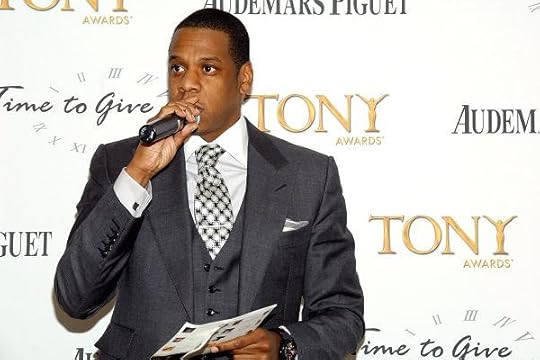
Joe Corrigan | Getty Images
This is a deal that began with Jay Z getting the rights to his masters back as part of his deal to become the CEO of Def Jam Records. That was followed by the launch of his own entertainment company in Roc Nation, which now represents major artists and sports figures like Rihanna and Kevin Durant. And most recently he acquired Tidal, his own streaming service, to give himself and other musicians a platform to distribute their music digitally while having a stake in its ownership. And he did all of this while maintaining arguably the best run a rapper has ever had in the music industry. These deals didn’t just happen recently, they were built over decades of work.
There may be a temptation to call these brand deals selling out, but that suggest eases or a lack of care. These deals are the product of the opposite, a person carefully, meticulously, and brilliantly turning his very identity into a brand, one that has transcended his industry. Jay Z hasn’t sold out; companies have bought in.
Source:
http://www.cnbc.com/2017/06/30/jay-z-has-used-his-latest-albums-as-corporate-bargaining-chips.html


5 things entrepreneurs should never sacrifice while building a business
Sacrifices are important to success. In order to doggedly pursue a goal, some things have to be given up.
But figuring out what to sacrifice and when is not a simple equation.
In order to remain true to yourself and your company, you must consider elements of your life to be non-negotiable. Here the top five.
1. Your health
The exhausted, overworked entrepreneur is a tired and ill-informed stereotype. If a business owner is surviving on four hours of sleep a night and a diet of coffee and fast food, they’re not going to achieve much for their company.

Getty Images | Carl De Souza
Richard Branson is an avid kite surfer
Getting adequate sleep, exercising and eating a healthy diet will make you a more effective leader for your business. There is a direct link between health and productivity, and most successful entrepreneurs, like Richard Branson and Jack Dorsey, make it a priority.
Instead of pulling an all-nighter to troubleshoot your website, go to bed. Wake up early and tackle it in the morning. The more exhausted your brain, the less efficiently you’ll operate and the more likely you’ll make a mistake.
Build exercise, sleep and healthy eating into your schedule. Make time to work out on your lunch break, set a firm bedtime for yourself or spend an hour meal-planning on Sundays. Sacrificing your health for the sake of your business is counterproductive.
2. Your family
It doesn’t have to be a “family” in the traditional sense. It means your support network — the people around you who hold you up, ground you and provide a reliable safety net. No entrepreneur is anything without these people.
Your family might be your spouse and children, a close circle of friends or your parents. Whomever they are, you can’t sacrifice your family in the pursuit of your business goals.
You will lose some headspace while attending to your business. It will require a lot of attention, but that attention shouldn’t be to the detriment of your inner circle. The people who have helped you get to this point should never take the backseat. Always make time to appreciate them and recognize them.
Mark Zuckerberg, for example, makes it a point to be home three nights a week to give his daughter a bath.
Your priorities speak volumes about your character, so it’s important to keep those priorities straight if you want to be successful.
3. Your vision
People will pull you left and right as you build your business. It can be easy to get confused and forget the original vision and mission of your company. Don’t let this happen.
While it’s important to be adaptable, it’s also important to stay committed to your vision. Don’t let the negativity and criticism of others diminish your idea. Many of the most famous and innovative entrepreneurs, like Elon Musk, were told many times that they were crazy.
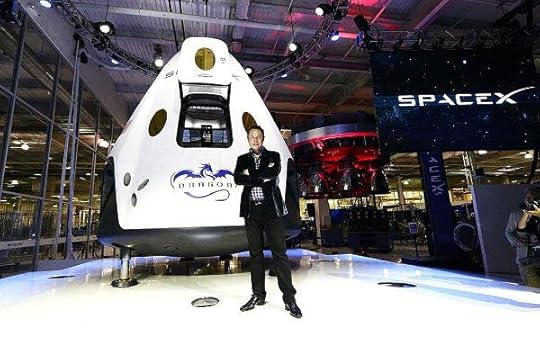
Photo by Kevork Djansezian
Elon Musk, founder and CEO of SpaceX
People will try to get you to change your ideas so much that you don’t recognize them anymore. But as an entrepreneur, you cannot afford to sacrifice your vision.
4. Your curiosity
A unifying characteristic of successful entrepreneurs is curiosity: a willingness to think of things differently, consider the impossible and flesh out complex ideas.
This curiosity is a playful thing, and some entrepreneurs find themselves sacrificing it when they move into the formal environment of the business world. But curiosity breeds innovation, which is integral to your business’s success.
Warren Buffett says that both he and Bill Gates are motivated by curiosity.
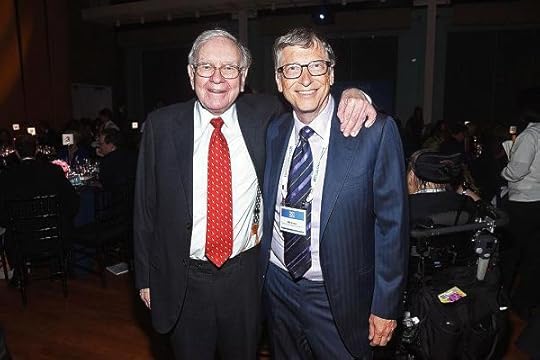
Photo by Dimitrios Kambouris
Warren Buffett and Bill Gates are friends and leading voices promoting philanthropy.
Don’t let formality and seriousness overcome you. Always remain playfully curious, as this quality will help — not hinder — your business growth.
5. Your team
The people whom you bring on to help build your business — from your partner to your website designer — are central to your mission. These people aren’t the backs upon which you build a business, they are the business.
Like your family, your employees should be treated with respect and appreciation at all times. Sacrificing your relationship with the team that holds up your business will only hurt your progress and tarnish your company’s reputation. Just ask Uber’s Travis Kalanick.
Holding true to a set of values will improve not only the way people perceive you as a boss and business owner, but your self-image as well. A business isn’t worth much if you give away literally everything — your health, your values, your family—to get it. When it comes time to make the hard decisions, don’t let go of these parts of your life.
Source:
http://www.cnbc.com/2017/07/03/successful-entrepreneurs-never-sacrifice-these-5-things.html


France Plans to End Sales of Gas and Diesel Cars by 2040
France is joining a growing movement to force the extinction of vehicles that run on fossil fuels, saying on Thursday that it would aim to end the sale of gasoline and diesel cars by 2040.
The target is less ambitious than ones set by countries like Norway and India. Still, coming from a major car-producing country, France’s declaration gave additional momentum to efforts to fight climate change and urban smog by promoting the use of electric cars.
The timing of the announcement was also significant, a day after the automaker Volvo said it would phase out the internal combustion engine, and during a visit to Europe by President Trump. The announcement by Nicolas Hulot, the French environment minister, was an expression of European leaders’ determination to pursue an environmental agenda despite Mr. Trump’s repudiation of the Paris agreement on climate change.
[image error]
“It’s a very difficult objective,” Mr. Hulot said Thursday. “But the solutions are there.”
The plan to phase out gasoline and diesel cars is part of a broader effort by France to limit global warming, which Mr. Hulot outlined Thursday. The country will also stop issuing new oil and gas exploration permits this year, and stop using coal to produce electricity by 2022, he said.
Mr. Hulot’s statement was the latest sign that the century-long reign of the internal combustion engine may be slowly coming to an end.
On Wednesday, Volvo said that all of its new models beginning in 2019 would be either battery-powered cars or hybrids that combined electric motors with diesel or gasoline engines.
The company, based in Sweden, said it will not introduce any new designs powered solely by conventional internal combustion engines — a first for a major carmaker. Mr. Hulot referred to Volvo’s announcement during his remarks in Paris on Thursday.
There was no immediate reaction to the government’s statement from France’s two major carmakers, Renault and the PSA Group, which makes Peugeot and Citroën cars.
Renault began selling battery-powered cars in 2011, and was among the first major carmakers to do so.
While electric cars still only amount to a sliver of the market, sales have been growing fast. Renault sold 17,000 of its battery powered Zoe compact cars in the first six months of 2017, almost as many as in all of 2016.
France faced some criticism that its plan was not ambitious enough. Norway plans to sell only electric cars starting in 2025, and India plans to do so in 2030.
Since cars usually last about 15 years, France’s target means that gasoline and diesel cars would be on the road until 2055. That is too long to meet France’s own climate change goals, said Greg Archer, director of clean vehicles at Transport & Environment, an advocacy group in Brussels.
But Mr. Archer added that France’s move “is absolutely the right direction to be taking.”
Such an expression of government resolve can prompt companies to devote more resources to developing electric vehicles, and encourage investors to put money into clean transportation start-ups. France’s move could also put pressure on Germany and other European countries to promote electric vehicles.
Mr. Archer said, though, that it was essential for France to follow up with incentives and regulations that encouraged the use of electric cars. Mr. Hulot gave no specifics about how the government planned to meet its target.
The German government originally planned to put one million electric vehicles on the country’s roads by 2020, but has admitted it will fall far short of that goal. The government was slow to offer financial incentives and build public charging stations.
“It’s great to have a vision,” Mr. Archer said. “We have to now see the policies put in place to deliver on that vision.”
Source:


This former Google[X] exec is building a high-tech hat that she says will make telepathy possible in 8 years
Imagine if telepathy were real. If, for example, you could transmit your thoughts to a computer or to another person just by thinking them.
In just eight years it will be, says Openwater founder Mary Lou Jepsen, thanks to technology her company is working on.
Jepsen is a former engineering executive at Facebook, Oculus, Google[x] (now called X) and Intel. She’s also been a professor at MIT and is an inventor on over 100 patents. And that’s the abbreviated version of her resume.
Jepsen left Facebook to found Openwater in 2016. The San Francisco-based start-up is currently building technology to make medical imaging less expensive.
“I figured out how to put basically the functionality of an M.R.I. machine — a multimillion-dollar M.R.I. machine — into a wearable in the form of a ski hat,” Jepson tells CNBC, though she does not yet have a prototype completed.
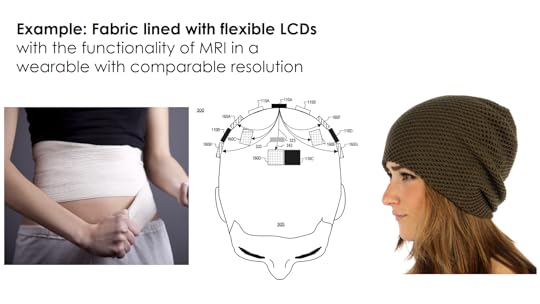
So what does that hat have to do with telepathy?
Current M.R.I. technology can already see your thoughts: “If I threw [you] into an M.R.I. machine right now … I can tell you what words you’re about to say, what images are in your head. I can tell you what music you’re thinking of,” says Jepsen. “That’s today, and I’m talking about just shrinking that down.”
One day Jepsen’s tech hat could “literally be a thinking cap,” she says. Jepsen says the goal is for the technology to be able to both read and to output your own thoughts, as well as read the thoughts of others. In iconic Google vocabulary, “the really big moonshot idea here is communication with thought — with telepathy,” says Jepsen.
“THE REALLY BIG MOONSHOT IDEA HERE IS COMMUNICATION WITH THOUGHT — WITH TELEPATHY.”-Mary Lou Jepsen, founder and CEO of Openwater
Traditional M.R.I., or magnetic resonance imaging, uses magnetic fields and radio waves to take images of internal organs. Openwater’s technology instead looks at the flow of oxygen in a person’s body illuminated with benign, infrared light, which will make it more compact and cheaper.
“Our bodies are translucent to that light. The light can get into your head,” says Jepsen, in an interview with Kara Swisher of Recode.
If Jepsen is right and one day ideas will be instantly shared or digitized, that would significantly speed up the process of creating, learning and communicating. Today, it takes time to share an idea, whether by talking about it or writing it down. But telepathy would make all of that instantaneous.
“Right now our output is basically moving our jaws and our tongues or typing [with] our fingers. We’re … limited to this very low output rate from our brains, and what if we could up that through telepathy?” asks Jepsen.
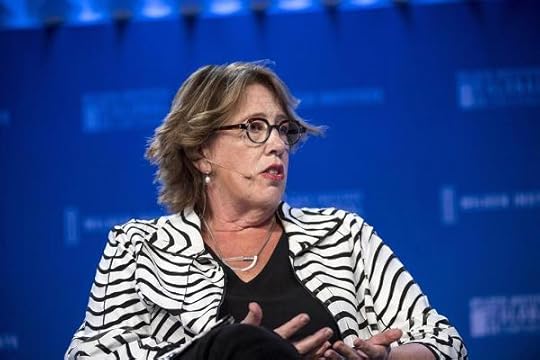
Photo by Bloomberg
Mary Lou Jepsen, founder and CEO of Openwater
Instant transfer of thoughts would also speed up the innovation process. Imagine being a filmmaker or a writer and being able to download the dream you had last night. Or, she suggests, what if all you had to do was think of an idea for a new product, download your thought and then send the digital version of your thought to a 3-D printer?
“That makes our iteration cycle so much faster,” says Jepsen.
Jepsen is not the only one dreaming of communication by thought. Earlier this year, Elon Musk launched Neuralink, a company aiming to merge our brains with computing power, though with a different approach.
“Elon Musk is talking about silicon nanoparticles pulsing through our veins to make us sort of semi-cyborg computers,” says Jepsen. But why not take a noninvasive approach? “I’ve been working and trying to think and invent a way to do this for a number of years and finally happened upon it and left Facebook to do it.”
Talk of telepathy cannot happen without imagining the ethical implications. If wearing a hat would make it possible to read thoughts, then: “Can the police make you wear such a hat? Can the military make you wear such a hat? Can your parents make you wear such a hat?” asks Jepsen.
What if your boss wanted you to wear a telepathy hat at the office?
“We have to answer these questions, so we’re trying to make the hat only work if the individual wants it to work, and then filtering out parts that the person wearing it doesn’t feel it’s appropriate to share.”
Source:













